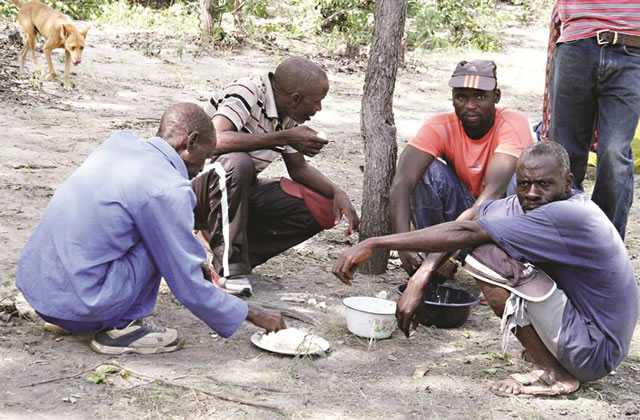Hashim Mbita hero of liberation in Africa

 Phyllis Johnson
Phyllis Johnson
Hashim Mbita stood tall as a hero of the liberation struggle in Africa, and he was widely respected for his principles and dedication.
His life touched every person who lives in the region, whether they know that or not.He died in Dar es Salaam, age 81, on Union Day, April 26, the date that Tanganyika and Zanzibar were united in 1964 to create the United Republic of Tanzania. Unity is the message left behind.
He was a proud Tanzanian who became a de facto southern African due to his role in the liberation of the region.
Brigadier-General Mbita (retired) was the Executive Secretary of the Liberation Committee for 22 years, from 1972 until his mission was accomplished in 1994 when the liberation of the subcontinent was completed with democratic elections in South Africa leading to majority rule.
He was honoured by the Southern African Development Community (Sadc) with the Sir Seretse Khama medal, and by the African Union with its first “Son of Africa” award.
At the Sadc Summit last year in Victoria Falls, Zimbabwe awarded Mbita the highest national honour that can be given to a foreigner, The Royal Order of Munhumutapa.
He joined a list of only 6 recipients of that award, and all of the others were founding presidents of their respective countries — Angola, Botswana, Mozambique, Tanzania and Zambia.
The citation reads: “For the important role he played in regional liberation as well as integration during his 20-year tenure as the Executive Secretary of the Liberation Committee of the Organisation of African Unity (OAU) — precursor to the African Union (AU).”
The OAU Liberation Committee was hosted in Dar es Salaam by the government of Tanzania, at the invitation of the founding President, Mwalimu Julius Nyerere, who was Mbita’s mentor, teacher and commander.
The Liberation Committee provided and coordinated material support for the African liberation movements who had to fight for independence during a 30-year period from 1963 to 1994, and without that support, most of southern Africa would not yet be independent.
He turned the tide of the liberation struggle in southern Africa when, soon after his appointment in 1972, he visited the liberated areas of northern Mozambique with the Mozambique Liberation Front (Frelimo).
He wanted to see the situation on the ground for himself, and determine their needs. He was impressed with what he saw in the well-organised liberated zones, but he learned that they were subject to bombing by the Portuguese colonial forces.
His response was to organise anti-aircraft weaponry for Frelimo, and the rest is history.
Frelimo advanced and the Portuguese military officers soon realised that they could not win the colonial wars in Africa. Their Movement of the Armed Forces seized power from the undemocratic and dictatorial regime in Lisbon, opened contacts through various third parties, and entered into negotiations with Frelimo for a transitional government that took office in 1974 and independence in June 1975.
Angola gained independence a few months later, in November 1975, followed by Zimbabwe in 1980, Namibia in 1990, and finally, democratic elections in South Africa in 1994.
At a conference held in Arusha, Tanzania to close the liberation committee in August 1994, Mbita titled his statement “Mission Accomplished”.
He dedicated the final report of the Liberation Committee to the “gallantry of Africa’s freedom fighters, especially to the memory of those who did not live to see the dawn of this era in Africa. This is a tribute to their courage, a salute to the heroes and heroines of African liberation.
“To Eduardo Mondlane, Amilcar Cabral, Herbert Chitepo, JZ Moyo, Josiah Tongogara, Steve Biko, David Sebeko, Duma Nokwe, Johnny Makatini, Peter Nanyemba, Solomon Mahlangu, and, most recently, Chris Hani and Oliver Tambo, as well as the numerous unknown combatants of the African Liberation Struggle.”
Mbita was born in 1933 in Tabora, in western Tanzania, where his father was a clerk at Tanganyika Railways and he got his son into the elite Tabora Boys School on academic performance, among whose alumni counted Julius Kambarage Nyerere, who became the founding president of Tanganyika and later Tanzania.
Young Mbita was active in the cooperative movement that gave Tanzania most of its early leadership, and joined the pro-independence party, the Tanganyika African Nation Union (TANU) in 1958.
He moved to Dar es Salaam the year before independence, when young people, mainly men, were being recruited for in-service training in the colonial civil service in preparation for independence in December 1961.
He was assigned to the press section of the ministry of information, soon becoming press secretary to President Nyerere at State House, and hosting the media during official visits such as that of the then Chinese premier, Zhou Enlai, whom he greatly admired.
Mbita rose through the ranks in party and government to become the Secretary-General of TANU before being sent by Nyerere to the Tanzania People’s Defence Force as political commissar. He went for military training in Tanzania, as well as Britain and elsewhere, and excelled, as he had with all of his other assignments.
By then, his president had prepared him for most important assignment of all, that of Executive Secretary of the OAU Liberation Committee. He resolved challenges and celebrated achievements, but he never took any credit for himself. He and his country believed that they were “just doing their duty” to the continent.
In addition to his humility and all of his other attributes, one of his long-time close friends gave him the best accolade as “a great human being”. — sardc.net











Comments